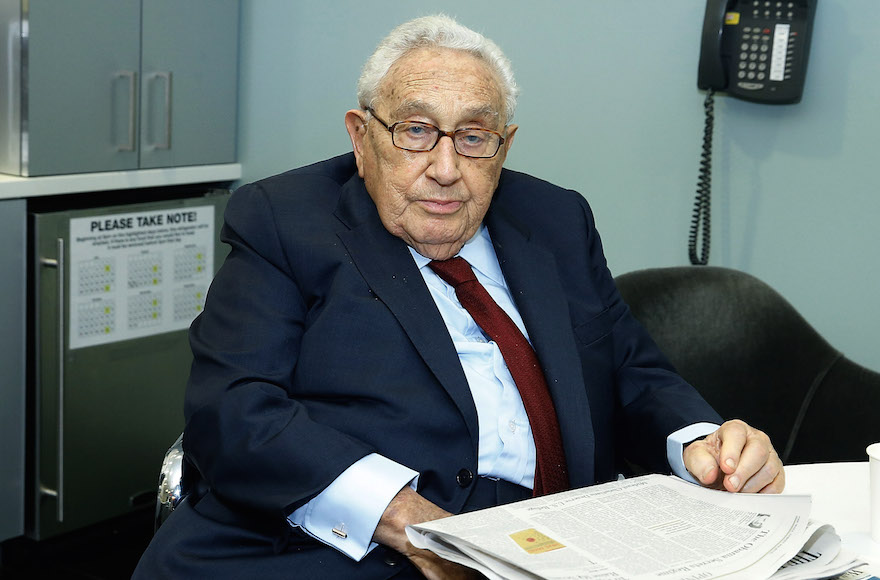
Tributes

Henry Kissinger dies at 100
JTA – Henry Kissinger, the first Jewish secretary of state and the controversial mastermind of American foreign policy in the 1970s, died at his home in Connecticut on Wednesday, 29 November, at 100.
Kissinger, credited with orchestrating the United States (US) opening to China; negotiating the end of the conflict in Vietnam; and helping ease tensions with the Soviet Union at the height of the Cold War, celebrated his 100th birthday in June with a party at the New York Public Library featuring luminaries from throughout his long career in politics and public affairs, including his current successor, Jewish Secretary of State Antony Blinken.
Regarded as a brilliant diplomatic strategist, Kissinger was one of the most influential Jewish figures of the 20th century, leaving an enduring imprint on global politics as secretary of state and national security advisor to two US presidents and as an informal advisor to several others.
With his rumbling German accent, iconic black glasses, and legendary charm, he was also a socialite and an unlikely 70s-era sex symbol, dating a string of movie stars and famously quipping that power is the “ultimate aphrodisiac”.
In spite of fleeing his native Germany as the Nazis rose to power in the 1930s and losing several members of his family in the Holocaust, Kissinger evinced little sentimental attachment to Jewish interests, telling a friend in the 1970s that Judaism “has no significance for me”, according to Walter Isaacson’s 1992 biography.
The negation of Kissinger’s Jewish identification may have been necessary for a man who rose higher in the executive branch than any Jew before him, and did so under a president, Richard Nixon, known to harbour deep anti-Jewish animus. Others saw it as emblematic of Kissinger’s embrace of realpolitik.
After Israeli Prime Minister Golda Meir pressed Nixon in 1973 to address the plight of Soviet Jews, Kissinger issued a blunt dismissal.
“The emigration of Jews from the Soviet Union is not an objective of American foreign policy,” Kissinger said, according to Oval Office recordings. “And if they put Jews into gas chambers in the Soviet Union, it’s not an American concern. Maybe a humanitarian concern.”
After the recordings were released in 2010, Kissinger apologised for the gas chamber remark in a Washington Post OpEd but maintained that his critics were taking it out of context. Kissinger went on to claim credit for the 100 000 Soviet Jews who emigrated thanks to Nixon’s “quiet diplomacy”.
Other elements of Kissinger’s record similarly suggest a more nuanced verdict on his approach to Jewish concerns. At the height of the Yom Kippur War in 1973, Nixon ordered an emergency airlift of resupplies to a struggling Israeli military, and memos from the period show Kissinger pushing back against the Pentagon’s reluctance to carry it out.
Later, Kissinger’s efforts to end the war gave birth to the term “shuttle diplomacy”.
Two years later, as Kissinger grew increasingly frustrated with Israeli intransigence in withdrawing from areas of the Sinai conquered in the 1967 war, he pushed Ford to conduct a “reassessment” of relations with Israel. That precipitated a deep crisis between the White House and the Israeli government, but it ultimately yielded an Israeli-Egyptian agreement to resolve outstanding disputes peacefully, which in turned paved the way for the peace treaty that followed four years later.
“There’s no way you could tell the story of Camp David and the Egyptian-Israeli peace treaty without mentioning Kissinger and the 1973 shuttle diplomacy,” said historian Gil Troy.
Troy also records a less glowing incident about Kissinger in his 2013 book Moynihan’s Moment. As US Ambassador Daniel Patrick Moynihan waged a public battle against the “Zionism is racism” resolution at the United Nations, Kissinger pushed back hard, fearing it would undermine his efforts to ease tensions with the Soviet Union, at one point grumbling, “We’re conducting foreign policy. This is not a synagogue.”
After leaving office, Kissinger appeared to shed some of his reluctance to be perceived as Israel’s champion, stating in a 1977 speech that, “The security of Israel is a moral imperative for all free peoples.” In the decades that followed, he publicly defended Israeli interests, arguing that the absence of Mideast peace was the product of Arab intransigence and expressing scepticism of efforts to conclude a nuclear deal with Iran.
That helped secure his embrace by the Jewish mainstream. In 2012, he received Israel’s highest civilian honour from President Shimon Peres for his “significant contribution to the state of Israel and to humanity”. In 2014, he received the Theodor Herzl Award from the World Jewish Congress.
Kissinger’s legacy remained deeply polarising decades after he left public office. In spite of winning the Nobel Peace Prize in 1973 for his work ending the Vietnam War – a deeply controversial choice at the time – many regard Kissinger as a war criminal responsible for the deaths of thousands of civilians in the US bombing of Cambodia and myriad other human rights violations in Argentina, East Timor, and elsewhere. His role in directing the controversial war in Vietnam dogged him for decades.
After he left office in 1977, hundreds of students and faculty opposed Columbia University’s decision to offer Kissinger an endowed chair, with one student demonstrator likening it to asking Charles Manson to teach religion. The author Christopher Hitchens called for Kissinger’s indictment in a 2001 book, The Trial of Henry Kissinger, which was later made into a film. On a 2001 trip to Paris, a French judge sought unsuccessfully to get Kissinger to testify in connection with the 1973 disappearance of five French nationals during the reign of Chilean dictator Augusto Pinochet.
Kissinger tried mightily to shape the public narrative of his years in office, penning multiple memoirs totalling thousands of pages. But even into his 90s, he could barely appear in public without inviting protests.
Kissinger is survived by his wife, Nancy Maginnes; two children from his first marriage to Ann Fleischer, whom he divorced in 1964; and five grandchildren.











Mason Hall
December 7, 2023 at 9:54 pm
Your obituary of Henry Kissinger does not not do him the justice he deserves. Lest we forget: He was DIRECTLY responsible for the deaths of hundreds of thousands, and the displacement of millions of innocents in Laos, Cambodia and North and South Korea. He engineered the overthrow of the democratically elected Allende government in Chile and facilitated the installation of the military dictatorship of Augusto Pinochet which lasted a mere 17 years. If the UN had the balls he should’ve been charged with war crimes and tried by the International Court of Justice. That he was a Jew is an absolute shanda.